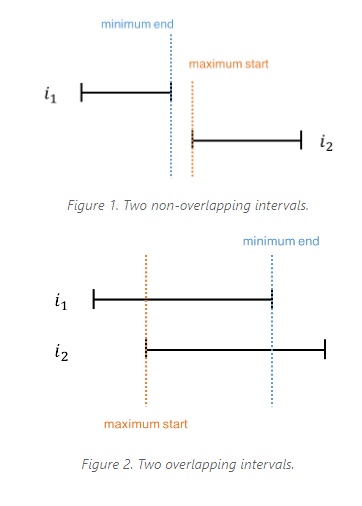Teaching Kids Programming: Videos on Data Structures and Algorithms
Given an array of meeting time intervals where intervals[i] = [starti, endi], determine if a person could attend all meetings.
Example 1:
Input: intervals = [[0,30],[5,10],[15,20]]
Output: falseExample 2:
Input: intervals = [[7,10],[2,4]]
Output: trueConstraints:
0 <= intervals.length <= 10^4
intervals[i].length == 2
0 <= starti < endi <= 10^6
Bruteforce Algorithm to Check If Any Intervals Overlapping
If any two meetings (intervals) overlap, then we can’t attend all the meetings. Thus we can bruteforce all pairs of meetings in O(N^2) to see if they overlap. To find out if two meetings overlap, we check their ends:
The overall time complexity is O(N^2).
1 2 3 4 5 6 7 8 9 10 11 12 | class Solution: def canAttendMeetings(self, intervals: List[List[int]]) -> bool: n = len(intervals) def overlap(a, b): return min(a[1], b[1]) > max(a[0], b[0]) for i in range(n): for j in range(i): if overlap(intervals[i], intervals[j]): return False return True |
class Solution:
def canAttendMeetings(self, intervals: List[List[int]]) -> bool:
n = len(intervals)
def overlap(a, b):
return min(a[1], b[1]) > max(a[0], b[0])
for i in range(n):
for j in range(i):
if overlap(intervals[i], intervals[j]):
return False
return TrueSorting Algorithm to Check If Any Intervals Overlapping
If we sort the intervals by their start, we can check if the current meeting is overlapping with the next one.
1 2 3 4 5 6 7 8 | class Solution: def canAttendMeetings(self, intervals: List[List[int]]) -> bool: n = len(intervals) intervals.sort(key=lambda x:x[0]) # or just intervals.sort() for i in range(len(intervals) - 1): if intervals[i][1] > intervals[i + 1][0]: return False return True |
class Solution:
def canAttendMeetings(self, intervals: List[List[int]]) -> bool:
n = len(intervals)
intervals.sort(key=lambda x:x[0]) # or just intervals.sort()
for i in range(len(intervals) - 1):
if intervals[i][1] > intervals[i + 1][0]:
return False
return TrueSorting takes O(NLogN) time complexity, we can rewrite above using one-liner via all or any method:
1 2 | return all(intervals[i][1] <= intervals[i + 1][0] for i in range(n - 1)) return not any(intervals[i][1] > intervals[i + 1][0] for i in range(n - 1)) |
return all(intervals[i][1] <= intervals[i + 1][0] for i in range(n - 1)) return not any(intervals[i][1] > intervals[i + 1][0] for i in range(n - 1))
–EOF (The Ultimate Computing & Technology Blog) —
loading...
Last Post: Teaching Kids Programming - Populating Next Right Pointers in Each Node (Breadth First Search Algorithm)
Next Post: Teaching Kids Programming - Recursive Depth First Search Algorithm to Find the Sum of Deepest Leaves in a Binary Tree
